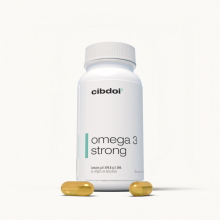Does Omega-3 Make You Leaner?
Published:
Omega-3 fatty acids have become one of the most popular dietary supplements due to their wide range of health benefits. One of the purported effects of omega-3s is enhancing fat loss and helping people achieve a leaner physique. But is there any truth to the claim that omega-3 can make you leaner? Let's objectively examine the evidence.
Contents:

What are Omega-3 Fatty Acids?
Before diving into the effects on body fat, it’s helpful to start with a quick refresher on what exactly omega-3 fatty acids are.
The Three Main Types of Omega-3s
There are three primary omega-3 fats that provide health benefits:
- ALA (alpha-linolenic acid)
- EPA (eicosapentaenoic acid)
- DHA (docosahexaenoic acid)
ALA is found mainly in plant sources like flaxseeds, chia seeds, and walnuts. EPA and DHA come primarily from fatty fish and fish oil supplements.
Essential for Health
Omega-3s are considered “essential” fatty acids because they cannot be produced by the body and must be obtained through the diet. They play crucial roles in brain function, eye health, fetal development, and reducing inflammation.
Powerful Anti-Inflammatory Effects
A major reason omega-3s are so beneficial is their ability to reduce inflammation throughout the body. EPA and DHA are particularly potent anti-inflammatories that can counteract the pro-inflammatory omega-6 fats prevalent in modern diets.
Now that you have a brief background on what omega-3s are, let’s analyze the evidence surrounding whether these essential fats can help you lose body fat and become leaner.
Mechanisms for Omega-3s Promoting Fat Loss
Before looking at direct clinical studies in humans, it’s helpful to understand some of the proposed mechanisms by which omega-3s are thought to aid fat loss and improve body composition:
1. Increasing Metabolic Rate
Some research suggests EPA and DHA from fish oil can increase metabolism and the amount of calories burned at rest. In one study, omega-3 supplements increased resting energy expenditure by over 400 calories per day in obese individuals.
Another study found higher omega-3 intake correlated to increased muscle mitochondria content. Mitochondria are the cells’ fat burning engines.
2. Reducing Lipogenesis and Fat Storage
Omega-3s are thought to shift metabolism more towards burning fat and away from storing it. Animal studies show omega-3s reduce activity of enzymes involved in lipogenesis, like fatty acid synthase.
Omega-3s may also suppress genes that increase fat storage like SREBP-1 and PPAR-gamma. This results in less lipogenesis occurring in fat cells.
3. Improving Insulin Sensitivity
One of the main drivers of excess fat storage is poor insulin control leading to consistently high levels of the hormone.
Omega-3s have been shown in studies to improve insulin sensitivity, which may allow the body to more efficiently use food for energy rather than shuttling it into adipose tissue.
4. Decreasing Inflammation
Chronic low-grade inflammation is closely associated with obesity and metabolic dysfunction. The potent anti-inflammatory effects of EPA and DHA may help reverse inflammation inhibiting fat loss.
For example, omega-3s can lower inflammatory cytokines like TNF-alpha and IL-6 that are often elevated with obesity.
5. Increasing Fat Oxidation During Exercise
Some research indicates taking fish oil supplements can boost the amount of fat burned during aerobic workouts at moderate to high intensities.
One study found people taking omega-3s burned 10% more fat during leg cycling exercise versus those given corn oil capsules. The omega-3s improved metabolic efficiency.
So in summary, omega-3s may promote leanness by optimizing fat burning, improving insulin sensitivity, reducing inflammation, and enhancing workout fat oxidation. But what does the clinical research show?
Findings from Human Clinical Studies
While the mechanisms above provide plausible theories for how omega-3s may reduce body fat, do the actual clinical studies in humans back this up? Let’s review the evidence.
Correlation Studies
Several large observational studies show associations between higher omega-3 intake from seafood and lower body weight and fat mass. One meta-analysis found each 0.5 gram per day increase in omega-3 intake was linked to nearly 2 pounds less body fat.
However, correlation does not prove causation. Those who eat more fish and omega-3s often have other healthy lifestyle habits that may confound the associations. So we must look at direct randomized trials.
Clinical Trials in Overweight/Obese Adults
A number of clinical trials have investigated the effects of omega-3 supplements on body composition in people who are overweight or obese.
Some studies have shown significant reductions in body fat percentage, waist circumference, and belly fat in those taking omega-3s versus placebo. But others have failed to find any fat loss benefits.
A 2012 meta-analysis combined data from all the trials done up until that point. The researchers concluded omega-3 supplementation resulted in significantly greater loss of body fat and weight compared to placebo.
However, the effects were relatively modest, averaging about 1.6 pounds greater loss for the omega-3 groups. More recent meta-analyses have found similarly small benefits.
Clinical Trials in Athletes & Bodybuilders
Other studies have looked specifically at omega-3 effects on body composition in athletes and bodybuilders undergoing training programs.
Some trials reported improved lean mass gains and fat loss in resistance trained individuals taking fish oil. But other trials found no significant difference versus placebo.
Again, meta-analyses combining all these studies indicate a small benefit for enhancing body composition in trained individuals, but effects are minor on average.
Dosing May Impact Effects
One issue with interpreting the clinical research is that studies have used a wide range dosing protocols. Some may have administered doses too low to significantly impact body fat.
Higher daily intakes of EPA and DHA in the range of 2-3 grams seem most likely to augment fat loss, especially when combined with exercise. Lower doses under 1 gram per day generally don’t have a strong impact.
So in summary, the human clinical data is mixed and shows minor effects on average. But higher omega-3 doses may improve the chances of seeing measurable fat loss.
Additional Diet & Lifestyle Factors
While omega-3 supplements on their own may provide a modest boost to fat loss, combining them with additional diet and lifestyle interventions can maximize results. Some synergistic strategies include:
- Increasing Protein Intake
Consuming more high-quality protein aids fat loss and prevents lean tissue loss while dieting. Omega-3s help enhance the fat burning effects of dietary protein.
- Reducing Refined Carbs
Minimizing refined carbs and sugars prevents blood sugar spikes and can improve insulin sensitivity. This optimizes conditions for fat cells to release their stored fat.
- Engaging in HIIT Workouts
Omega-3s seem most effective at boosting fat oxidation during high intensity aerobic intervals. This workout style maximizes fat burning.
- Optimizing Sleep
Getting enough high quality sleep regulates appetite hormones like leptin and ghrelin to control hunger cravings. Omega-3s also support sleep quality.
- Managing Stress
Chronic stress elevates cortisol which can drive fat storage, especially in the belly region. Omega-3s help mitigate stress.
Making lifestyle changes along with sufficient omega-3 intake provides the best shot maximizing fat loss results.
The Leanest Sources of Omega-3s
For those trying to reduce body fat, it’s also important to get your daily omega-3s from the leanest sources. Here are some top options:
- Fatty fish like salmon, sardines, anchovies, mackerel
- Fish oil or krill oil supplements
- Algal oil supplements
- Flaxseeds, chia seeds, walnuts
Fattier fish like tuna can contain higher amounts of pro-inflammatory omega-6s that may counteract the benefits of the omega-3 content. Lean protein sources like salmon and sardines are ideal.
And always opt for pure, third-party tested supplements to avoid excess saturated fats and contaminants.
Lifestyle Changes Are Critical
While this article has focused on the potential fat loss effects of omega-3 supplements, keep in mind that dietary and lifestyle interventions are much more impactful for achieving substantial, lasting weight loss.
Supplements alone will provide negligible results. But optimizing your omega-3 intake can serve as a nice addition to reinforce the effects of improved diet quality, increased physical activity, and other healthy lifestyle changes.
Some of the most effective lifestyle tips for fat loss include:
- Counting calories to maintain a modest daily deficit
- Eating more satiating protein and fiber
- Reducing consumption of processed carbs/sugars
- Engaging in strength training and cardio exercise
- Prioritizing sleep quality and managing stress
- Tracking progress over time and staying consistent
Before spending money on any shiny new supplement, be sure you are first addressing the key diet and lifestyle foundations required to get leaner.
Does Omega-3 Make You Leaner? Conclusion
In summary, the evidence suggests omega-3 fatty acids may provide a slight boost to metabolic rate, fat oxidation, insulin sensitivity, and body composition. However, the effects are relatively minor on average based on clinical studies performed so far.
Some of the key takeaways include:
- Benefits appear most pronounced at higher intakes of 2-3 grams of EPA/DHA daily
- Combining with exercise, sufficient protein, low sugar intake, and other lifestyle interventions can maximize results
- Lean protein sources like fatty fish and pure supplements are recommended
- Substantial, lasting fat loss requires a comprehensive approach of diet, exercise, and lifestyle optimization
While omega-3s alone won’t lead to dramatic body transformations, they provide one more tool that can contribute incremental benefits. Within a framework of evidence-based fat loss principles, optimized omega-3 intake may support the journey to achieving a leaner physique.















